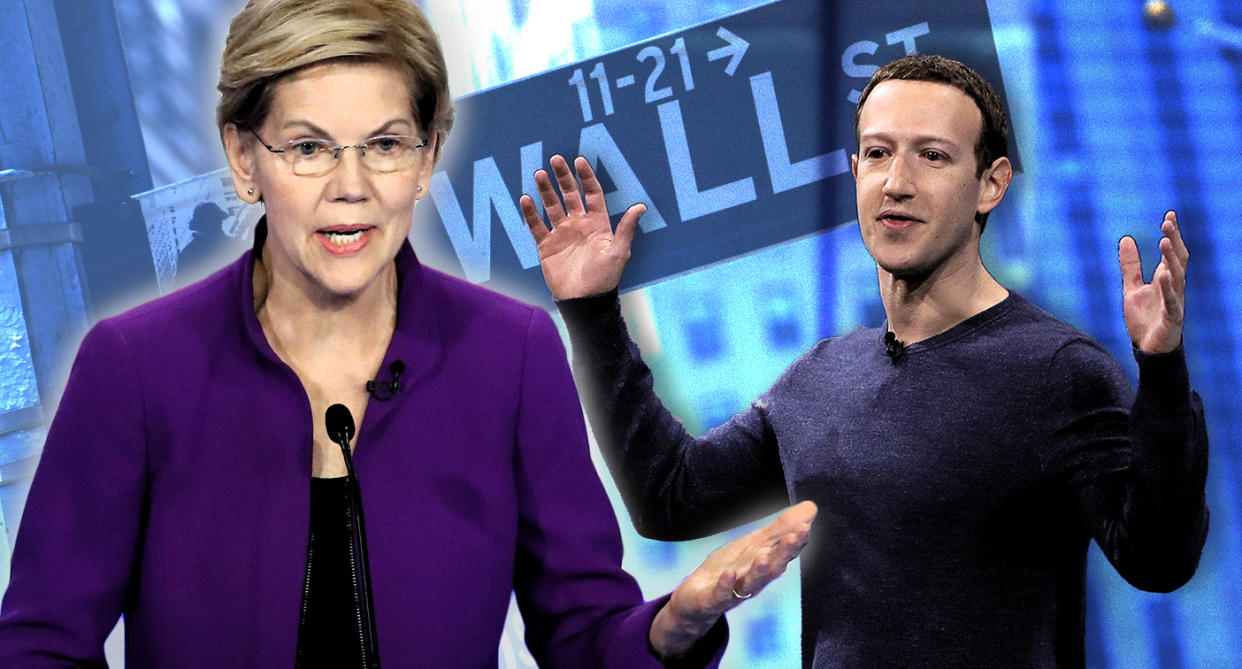2020 Vision Wednesday: Warren has the best enemies a Dem could want — big banks and big tech

Welcome to 2020 Vision, the Yahoo News column covering the presidential race with one key takeaway every weekday and a wrap-up each weekend. Reminder: There are 124 days until the Iowa caucuses and 398 days until the 2020 election.
With enemies like these, who needs friends?
In recent days, some of the most powerful business leaders in America have focused their ire on a single presidential candidate — Elizabeth Warren. There’s only one problem: By speaking out against the Massachusetts senator, these titans of industry may actually wind up boosting her in the Democratic primary and, if she gets that far, the general election.
The trend started on Sept. 26 with a CNBC story in which several aggrieved “Wall Street Democratic donors” warned that they were ready to “sit out, or back Trump, if [Democrats] nominate Elizabeth Warren.”
“You’re in a box because you’re a Democrat and you’re thinking, ‘I want to help the party, but she’s going to hurt me,’” one such donor told CNBC, alluding to Warren’s many plans to curb Wall Street’s influence, including a wealth tax. “‘So I’m going to help President Trump.’”
Then on Tuesday, the Verge published leaked text and audio from a July internal meeting at Facebook at which CEO Mark Zuckerberg railed against Warren, vowing to “go to the mat” to fend off her plan to break up big tech.
“If she gets elected president, then I would bet that we will have a legal challenge, and I would bet that we will win the legal challenge,” Zuckerberg said. “And does that still suck for us? Yeah ... but look, at the end of the day, if someone’s going to try to threaten something that existential, you go to the mat and you fight.”
Warren’s response? Undisguised glee. “What would really ‘suck,’” she tweeted after the Zuckerberg recordings surfaced, “is if we don’t fix a corrupt system that lets giant companies like Facebook engage in illegal anticompetitive practices, stomp on consumer privacy rights and repeatedly fumble their responsibility to protect our democracy.”
Then she tweeted about her plan to #BreakUpBigTech eight more times over the next 24 hours.
Same with the Wall Street dustup. “I’m Elizabeth Warren and I approve this message,” she wrote on Twitter, retweeting a CNBC segment about the story.
And that pretty much sums up the thinking in Warrenland: These disses from Zuckerberg and Wall Street so perfectly capture our candidate’s anticorruption message, they might as well be campaign ads.

Warren’s people might be right. Donald Trump won the 2016 election because he conveyed a kind of unorthodox populism that combined cultural appeals to “Make America Great Again” with economic promises that resonated in the Rust Belt. But as president he has not delivered on the economic part of the bargain, choosing instead to pass a $1.5 trillion tax cut that largely benefited rich people and corporations.
Warren’s whole pitch is that she is the sort of economic populist Trump only pretended to be. And like any populist, she tends to divide the world into Us (average Americans and their advocates, like Warren) and Them (corporate fat cats and those she sees as their enablers, like Trump).
Now those fat cats are playing along — and they’re unlikely to win the popularity contest. According to the Pew Research Center, the share of Americans who believe tech companies like Facebook have a positive impact has tumbled 21 percentage points over the past four years; at the same time, negative views of tech companies have nearly doubled. A September survey showed that nearly two-thirds of Americans would support breaking up big tech to ensure more competition — including 60 percent of Republicans. Meanwhile, about six in 10 Americans say they are bothered “a lot” by the feeling that some corporations (62 percent) and wealthy people (60 percent) do not pay their fair share in taxes, and most Americans (63 percent) say the economic system in the United States unfairly favors powerful interests.
To date, Warren’s biggest handicap has been her perceived lack of “electability”; it’s why she still trails Joe Biden in national polls, though that gap is closing fast and she is starting to overtake him in Iowa and New Hampshire. As a result, her support has been largely concentrated among college-educated white voters, with lower numbers among black voters and working-class whites. The key to broadening her base — and eventually mounting a populist challenge to Trump — may be convincing these Democrats that she is the one of “Us” most feared by “Them.”
And that’s exactly what Zuckerberg and Wall Street are helping Warren do.
Download the Yahoo News app to customize your experience.
Read more from Yahoo News:





